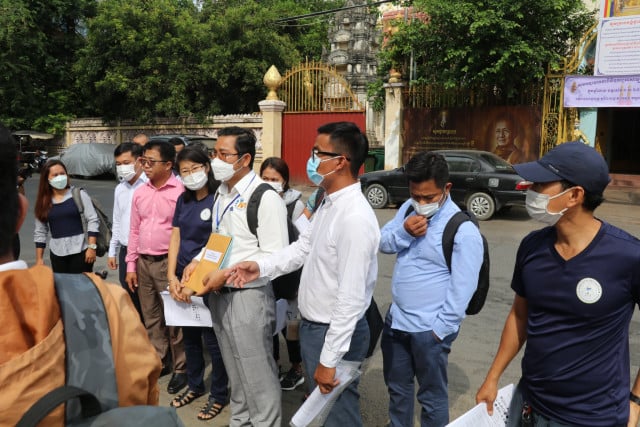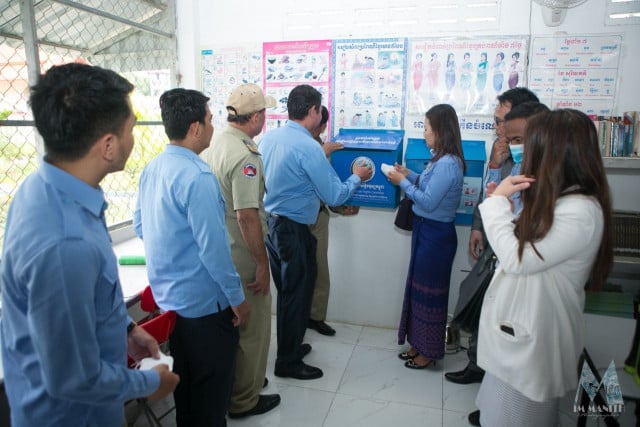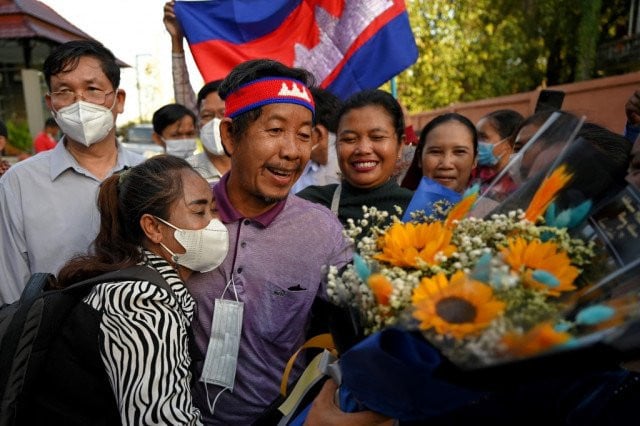Thai Parliament Debates Police Reform Amid Latest Scandal
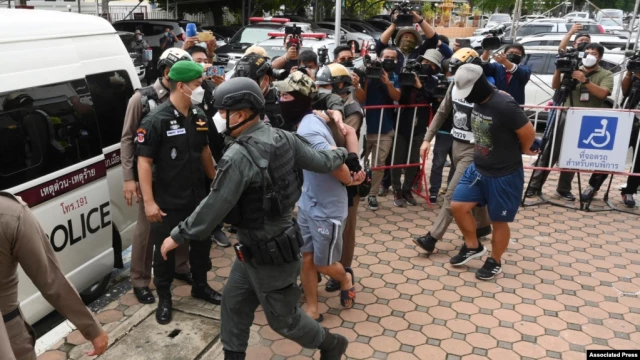
- By Voice of America
- October 3, 2021 10:43 AM
BANGKOK--The high-profile investigation of a Thai police colonel accused of killing a drug suspect in an alleged extortion-bid-gone-wrong is shining new light on the government’s long-overdue pledge to reform the country’s notoriously corrupt police force and focusing attention on a bill now inching through Thailand’s National Assembly.
Thailand’s 2017 Constitution, drafted by the military regime that had toppled a democratically elected government three years earlier, promised to have police reforms underway within 12 months.
More than four years on, lawmakers are still wrangling over the details.
A cabinet-approved bill recommending a raft of police reforms passed its first of three requisite readings in the Assembly on February 24, though officials do not expect a final vote until next year. The plan will need the endorsement of King Maha Vajiralongkorn, Thailand’s constitutional monarch, before taking effect.
Analysts and rights groups say the bill makes some promising proposals but wonder whether they are enough to truly reform a police force widely seen as having made a culture of corruption, and if political elites who thrive off the status quo will have the will to put it all in practice.
On paper, “it’s a great bill,” said Paul Chambers, a lecturer at Thailand’s Naresuan University who studies the country’s security forces.
“But I don’t think it can be enforced,” he added. “Because a major problem in Thailand is enforcement.”
First draft
The added pressure to reform follows the death of suspected drug dealer Jeerapong Thanapat in police custody on August 6 in the central Thai province of Nakhon Sawan. The case vaulted to national attention a few weeks later when CCTV footage of station chief Thitisant Utthanaphon appearing to asphyxiate the handcuffed suspect by wrapping several plastic bags over his head found its way online.
Police soon arrested Thitisant and the other officers seen helping him in the video. The station chief has admitted to abusing the suspect but denied seeking a bribe.
The case has jolted the public as much for its brutality as for Thitisant’s lavish lifestyle on an official monthly salary of only $1,300. Investigators have told local media that the colonel, nicknamed “Joe Ferrari,” had amassed an $18 million fortune featuring a luxury villa and a fleet of top-end sports cars.
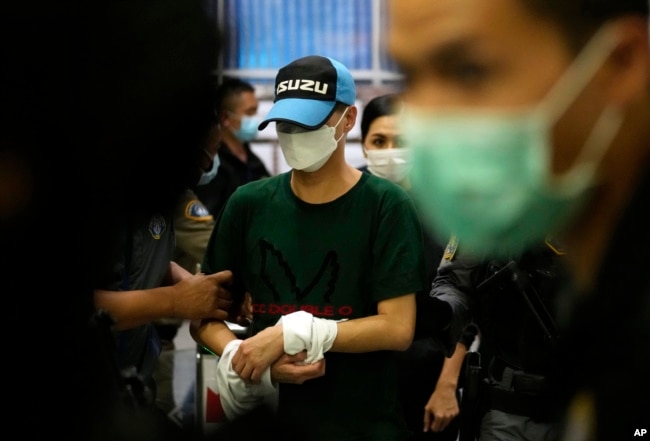
Thai police escort former police station chief Thitisant Utthanaphon, known as "Jo Ferrari," as they leave the Crime Suppression Division in Bangkok, Thailand, Aug. 26, 2021.
The government says the police reform bill now under consideration would help stem similar abuse.
Addressing the Senate in January, Deputy Prime Minister Wissanu Krea-ngam said the recommended changes would bring “more transparency and efficiency” to the force and “help keep the police in line.”
The bill aims to discourage the practice of paying for promotions by placing more emphasis on seniority and past performance. It proposes a new board to hear complaints against police, and an “ethics and morality protection committee” to oversee human resources. Wissanu told the Senate the bill would also give the public a role in evaluating the performance of officers at their local station, though exactly how would be worked out later.
The proposals “can address some problems,” Chavanut Janekarn, a retired 25-year veteran of the police force who sits on the bill review committee at the invitation of the opposition Move Forward party, told VOA.
He is especially encouraged by the promise of the complaints board. Whereas the police now handle complaints against officers internally, the new board would include ex-officers, a former judge and public prosecutor, a lawyer and representatives of the national ombudsman and human rights commission, among others. Chavanut hopes that will inject some independence into future investigations of alleged police malfeasance.
Interference
However, Chavanut also says the bill falls short on some counts, for example by denying low-ranking officers a vote on members of a national police board that will both set policy and fill senior positions — now the remit of two separate bodies — and designating the prime minister as chair.
“I don’t like that because the politician interference [in] the police is one of the main problems of the police nowadays,” said the former police major, who now teaches law and criminal justice at Thailand’s Thammasat University.
Yingcheap Atchanont, program director at the Thai legal rights group iLaw, said putting the prime minister in charge of selecting the national police chief might work for a functioning democracy.
Like many Thais, though, he believes Prime Minister Prayut Chan-ocha, who as military general led the 2014 coup, won a rigged election in 2019, thanks in large part to a constitution, drafted by his own junta, that tipped the scales in his favor. The government insists the election was free and fair.
Under the current political order, Yingcheap said the bill could further entrench the military and political elites’ sway over the police, which, he noted, had backed the coup.
“We are living under a constitution that was designed to support this person to be prime minister, and now the new law will propose that this person will also have the power to select whoever to be chief of police, so it’s still a proposal that creates a stronger power for this regime,” he said.
The bill “doesn’t really change the system,” he added. “When we talk about police problems, we know that the biggest factor may be the culture inside.”
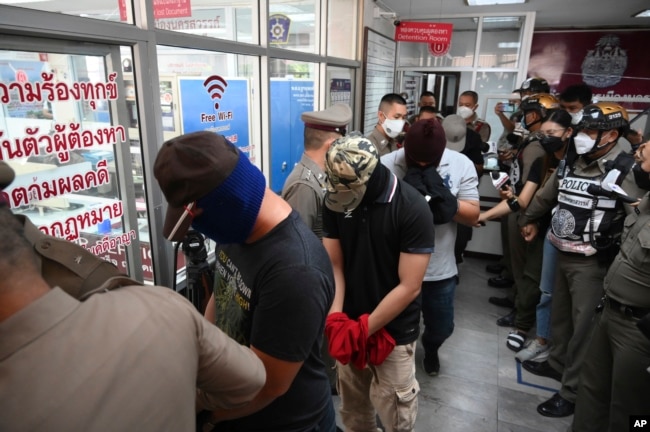
Police officers accused of complicity in the killing of a suspected drug dealer are escorted into a Nakhon Sawan police station for interrogations, in Nakhon Sawan province, Thailand, Aug. 25, 2021.
Chambers said the police have always had close ties to not only the military but the royal palace — the pinnacle of power in Thai society — that help shield the force from meaningful reform, and that those links have only been growing with recent appointments. He cited the current police chief, Suwat Jangyodsuk, a former aide to the king who leapfrogged over more experienced candidates, as a prime example.
With that power matrix firmly in place and getting stronger, Chambers said the latest scandal swirling around Thitisant would likely blow over with little lasting effect, as others have, even if the reform bill passes, as he expects it to.
In a case from just last year with strong echoes of Thitisant’s, several soldiers in Nakhon Phanom province allegedly tortured a suspected drug dealer to death in pursuit of a confession. In the wake of that scandal, “nothing changed,” said Chambers, “and judging by this one, I don’t think anything’s going to happen.”
Reality check
Chavanut wants the government to acknowledge the scale of the problem.
Speaking to reporters about Thitisant’s case in late August, police spokesman Ekarak Limsangkad blamed it on some “bad apples” in the force.
A survey of police station chiefs Chavanut conducted for a Senate seminar on the reform bill earlier this year suggests the rot is widespread, with endemic levels of political patronage, criminal collusion and bribery.
Of the roughly 1,700 station chiefs across Thailand, Chavanut surveyed 223. About 90% said political interference in their work and in job appointments posed major obstacles to police reform. Roughly 80% cited local politicians, business owners and gangs using the police to advance their criminal activities, and “corruption” in general. A full 83% cited position buying as another key hurdle.
“If you want to reform the police, the politicians have to have less power over the police. But the politicians don’t want to have less power,” Chavanut said. “This is the main problem.”
He said stiff debate in the bill review committee over the role of commissioned and noncommissioned officers, the composition of the national police board and other details have dragged out their work. With only 13 of the draft’s 172 sections settled, he does not expect them to wrap up any sooner than early next year.






